Assassin's Creed IV: Black Flag Review
Time to set sail with a new era for the franchise
Assassin’s Creed IV: Black Flag is the latest title in the long-running series detailing the adventures of historical figures alongside a modern-day storyline. Following the good, but somewhat underwhelming Assassin’s Creed III, the development teams across Ubisoft’s numerous studios have once again produced a full-fledged title just a year later. With Black Flag, the franchise finally has a fresh gameplay focus, interesting characters, and well organized multiplayer. It’s one of the best releases the series has seen in quite some time.
The main character of our tale is Edward Kenway, who just happens to be the eventual father of Haytham Kenway and grandfather of Connor, the two playable characters from the previous title. We follow Edward through the Golden Age of Piracy between the 1690s and 1730s, as he turns from British privateer to a pirate, unwilling to bend to either British or Spanish forces that dominate the game’s Caribbean island setting. Through the years, Edward’s goals remain pure to his own selfish interests – a trait that the franchise has yet to see, thus producing the first antihero in the Assassin’s Creed series. He is an exciting character to follow as we experience the life of a pirate, with more thrills than Connor could ever hope to produce.
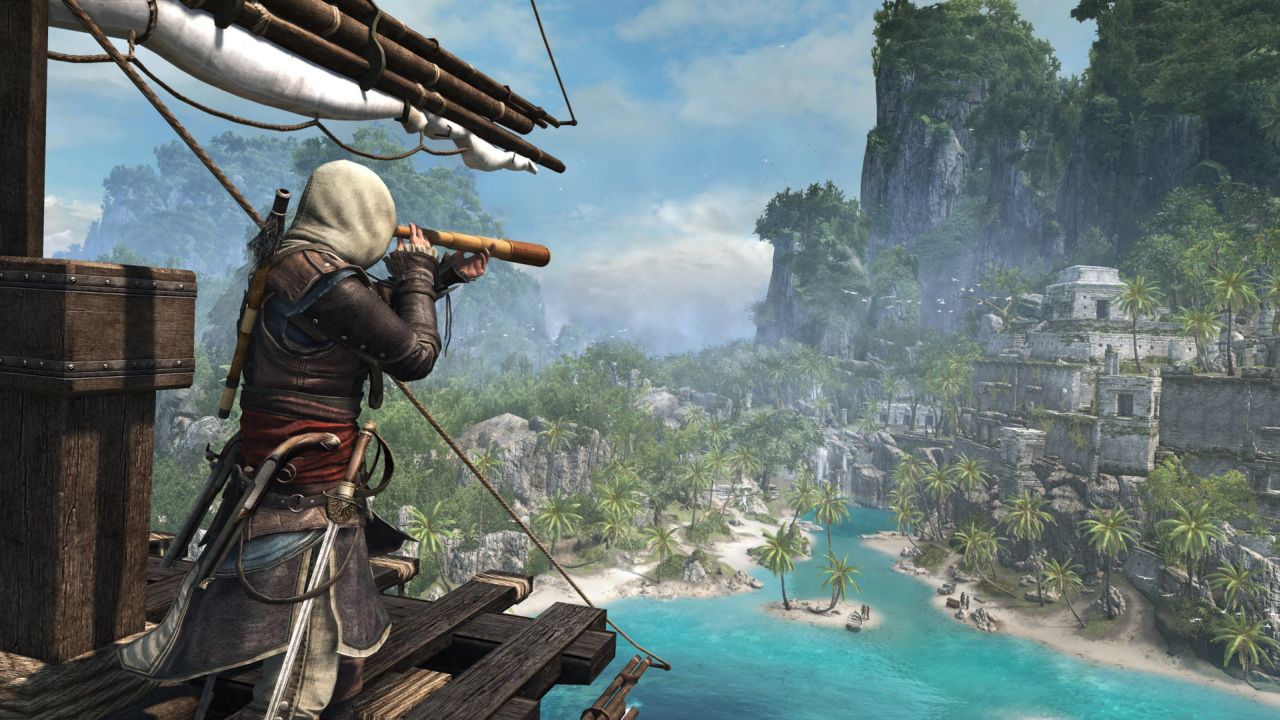
The plot of the game is also worthwhile and keeps moving at a brisk pace, not choosing to dilute itself with adjacent stories that has so often been the case in the series. You will come across famous personas from the time period, including Blackbeard, Benjamin Hornigold, James Kidd, and more. As is customary with the franchise, all of these characters are accurately recreated but with creative freedoms taken to suit the plot of the game.
Following the absolute but poorly written conclusion to the modern-day storyline in AC III, we start anew in Black Flag. Players now assume the role of a nameless and faceless protagonist, controlled through a first person perspective, who becomes an employee of Abstergo Entertainment. You are hired to investigate an important moment in Desmond Miles’ ancestry, the abovementioned Edward. The goal is to create an interactive movie to promote the use of Animus for the public, as the company hopes to go commercial with these memory extracting devices. Outside of walking around small office spaces and playing hacking mini-games, there’s not much interaction to be had for our mute player character. Of course, there is an underlying conspiracy and events begin to unravel with a brisk pace – they have to, given you spend very little time in the modern setting. It’s not long before things are messy again, and ill conceived memories of Desmond’s plotlines from games past come crawling back.
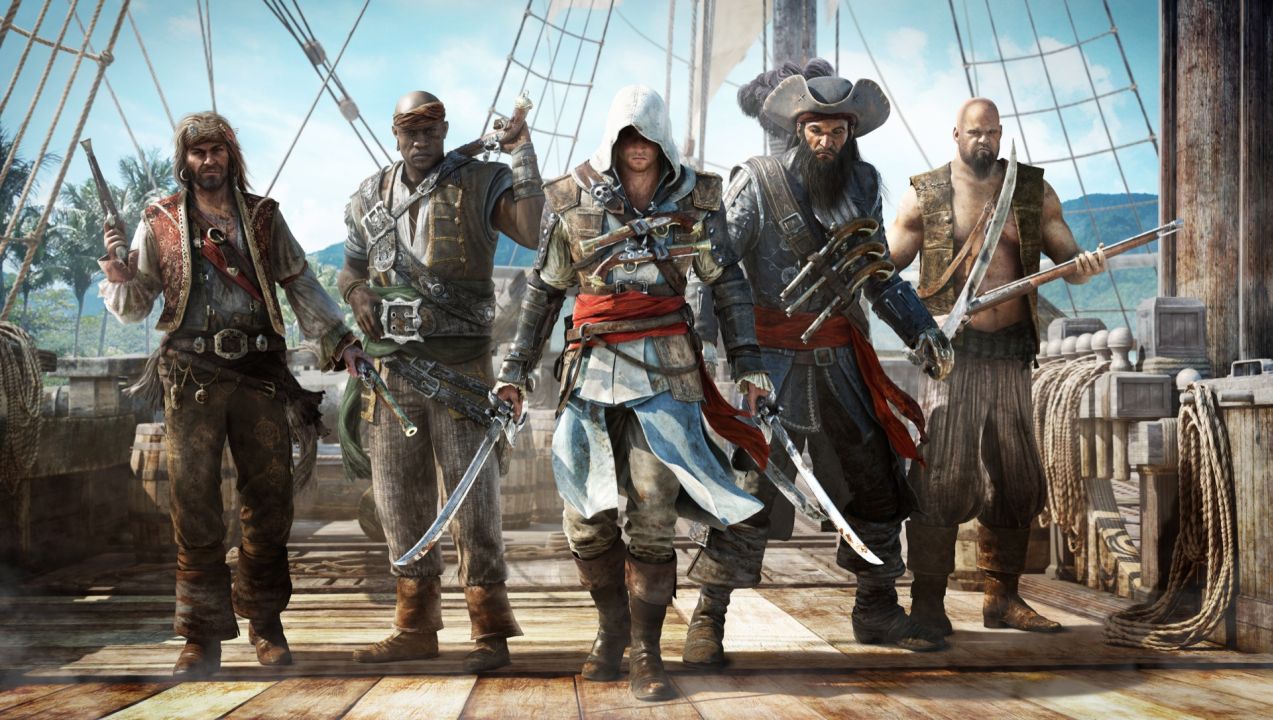
But at least the new perspective certainly adds something fresh to the franchise – but there is one underlying oddity. This Abstergo Entertainment company has far too many similarities with the real world Ubisoft – it appears during the actual game’s startup screens, Ubisoft itself is mentioned as a partner in the game with direct links to AC III Liberation, and everyone speaks French. It’s very meta, reaching uncanny valley territory that makes you wonder if the developers are getting carried away a little. You’re also asked to give story missions a rating, which again feels out of place.
But back to the main event. You can always count on Assassin’s Creed to produce a believable and enticing setting, and Black Flag is no different. Instead of exploring a few major cities with some wilderness space in between, the game turns the series formula into something fresh by making it all about the naval experience. If you enjoyed the moments of playing captain aboard your vessel in AC III, you’ll be happy to know that was seemingly a test run for Black Flag’s major selling point. Most of the map is covered with the Atlantic Ocean, with numerous islands and cities to visit and explore along the way. Once the story gets going and you’re in command of the Jackdaw (your ship), exploration is as exciting as ever.
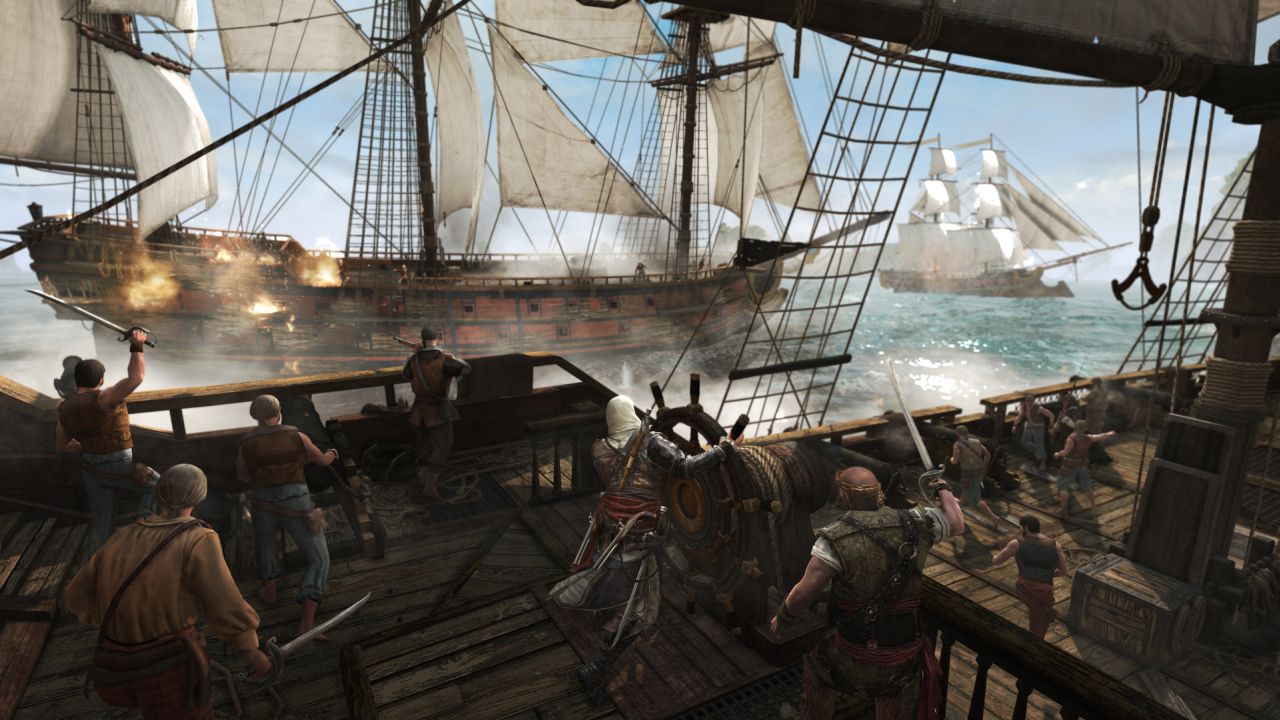
To start off with, all of the classic gameplay elements are still present. So any time you’re on land, whether it’s in a small coastal shack town or a major naval hub, the staple free running and melee combat are still at the core of the experience. You’ve got Animus fragments to collect, couriers to catch, contract assassinations to perform, viewpoints to synchronize and more. Treasure maps challenge players to find buried goods with only the hand drawn map and coordinates to guide you.
In combat, Edward is versatile and always dual-wields, lending him new finishing moves and animations. You can also carry up to four pistols at once now and fire in rapid succession, but need more time to reload. A major new weapon that helps with stealth is the blowpipe. Using sleeping or bezerk darks, you finally have a new option to distract or incapacitate the guards from a distance and with precision. On the other hand, guards utilize bells that signal for reinforcements if not disabled beforehand or you take out the enemy about to ring it. The ever-present Eagle Vision returns to help you track targets (including animals), but this time it even works through walls. It makes things easier, because keeping line of sight is possible through any building or obstacle, but on the other hand it looks disorienting, as if an overlay on the textures in front of you.
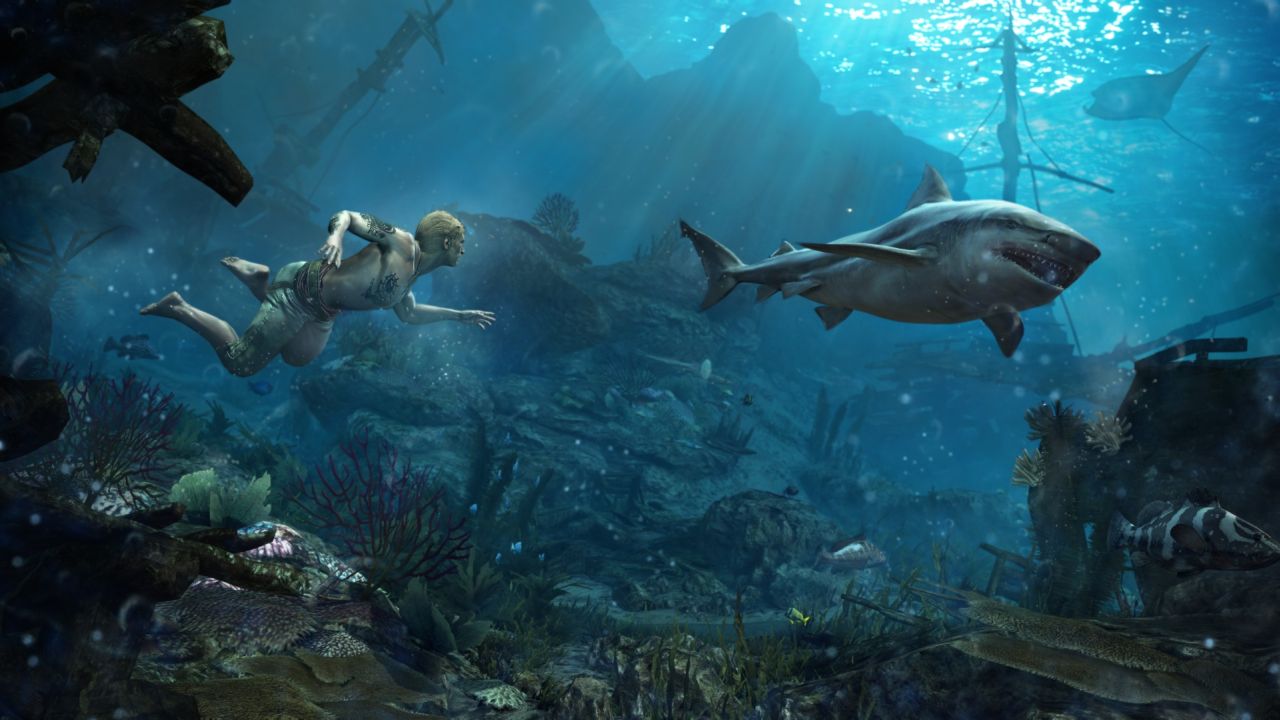
Anytime you’re not exploring in a city, you’re probably climbing trees and ruins in the wilderness areas. Again, the fragmented nature of exploration benefits the game. You’re not exploring a single large, sprawling forest ala AC III, instead you’ve got hidden caves, dense jungle, and wild predators around every corner. And you can actually explore it all and then move on, hopping on your ship and sailing away. This creates a seamless and freeform transition into naval play, and because most of the locations are relatively small compared to the endless urban density of past games, they feel like bite sized adventures that minimize repetition.
In the same way that gold and materials are needed to upgrade Jackdaw’s hull, weaponry, sails, and other elements, Edward himself can benefit from hunting. The islands are rich with wildlife, scattered across the game world in large variety. Hunting works the same way as AC III, however you lack any tools to attract or trap the animals, thus it’s more based on luck and outrunning your prey. With animal materials you can craft personal upgrades, such as health, more ammo pouches, etc. Fans who don’t want to bother with side activities will be happy to learn that all materials can be purchased from vendors, thus eliminating the need to search for that last rare animal skin you need to boost health. Later on, players get their own small island as a base, where you can construct buildings, so there is no shortage of money that can be spent on improvements and progression.
So as you might have guessed, the major selling point of the game is sailing across the open waters. Pirate games are extremely niche, and not since Sid Meier’s Pirates have there been any noteworthy titles to scratch this particular itch. Thankfully, Black Flag addresses the needs of fans of booty marvelously. Sailing across the vast Caribbean is freeing and captivating, with your crew’s collective singing helping add to the atmosphere. To the game’s credit, your ship’s speed is quite decent so while travel does take some time, it never drags on. But should you somehow be bored of sailing, fast travel is available to any previously visited location.
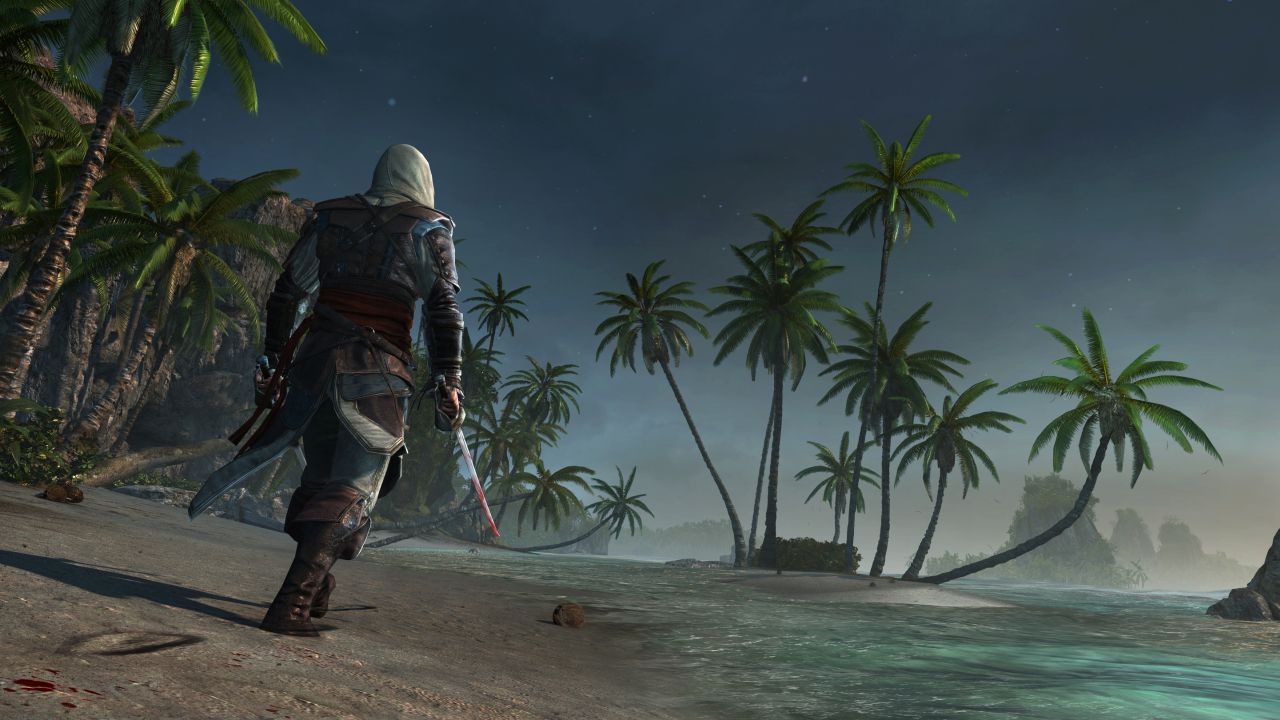
But it’s not all smooth sailing out there. You’re a pirate, after all, and the game’s major source of income is attacking ships. The game world is full of vessels floating around, some patrolling and some carrying goods to their destination. Using a telescope, you can zoom in on nearby ships and get an idea of their strength, as well as goods being carried. You’ll need the goods you plunder from these ships to upgrade the Jackdaw’s own strengths and defenses. Having picked a target, the game plays out very similarly to AC III’s mechanics. Steering your ship into position and firing is exciting, and the naval warfare seemingly never gets old, as you try to outmaneuver the bigger ships and go for the killing blow.
Once a ship is incapacitated, you can board it. This also plays to the very exciting pirate instincts of using a swingrope to jump onboard and go hand to hand with the enemy. Depending on the size of the ship, you’re tasked with defeating a certain number of crew members and taking out specific officers or blowing up ammunition reserves. Once the ship is taken, you get the option to repair Jackdaw, reduce your wanted level, or send it to Edward’s fleet. That brings us to one of the many gameplay elements that have made the transition to naval side. You now gain wanted levels only at sea, as on-land now your only worry is escaping the immediate restricted area and becoming anonymous. Getting rid of the wanted level is done via option described above, or by visiting a town and paying it off. Should you remain wanted, hunter ships will appear on the horizon, specifically to take you out.
Similarly, enemy forts are now naval installations instead of land missions. The world is divided into segments, each controlled by a fort. Taking over these forts reveals all naval locations of interest in the region, similarly to performing a sync on land. Your job is to circle around and take out the reinforcing walls and towers with your cannons, while dodging enemy fire and any other ships that happen in the area. Once all towers are down, you once again must engage in melee combat as you kill enemy officers and eventually take control of the war room. It’s a two-part naval combat/melee combat experience, much like robbing ships.
Side activities are also present. You can go fishing by harpooning whales and sharks in a fairly challenging and exciting minigame, or go underwater for the first time in the franchise. These underwater exploration sections occur at shipwreck locations, where your goal is to collect treasure while hiding from sharks and watching your oxygen level. It’s exciting and different, giving a new dimension to the gameplay, though nothing particularly revolutionary. When you’re simply sailing about, you can also pick up crew members and loot that floats around. The size of your crew is supposed to be important in the game for assaulting enemy vessels, but that requirement never materializes. In addition, the game also throws storms at random. These weather events introduce strong winds, hurricanes and huge waves that can damage your ship if you don’t avoid them. It’s really quite something to be engaged in a tense firefight against an enemy fleet in the middle of a raging storm, or trying to harpoon a huge whale as lightning strikes spark all around.
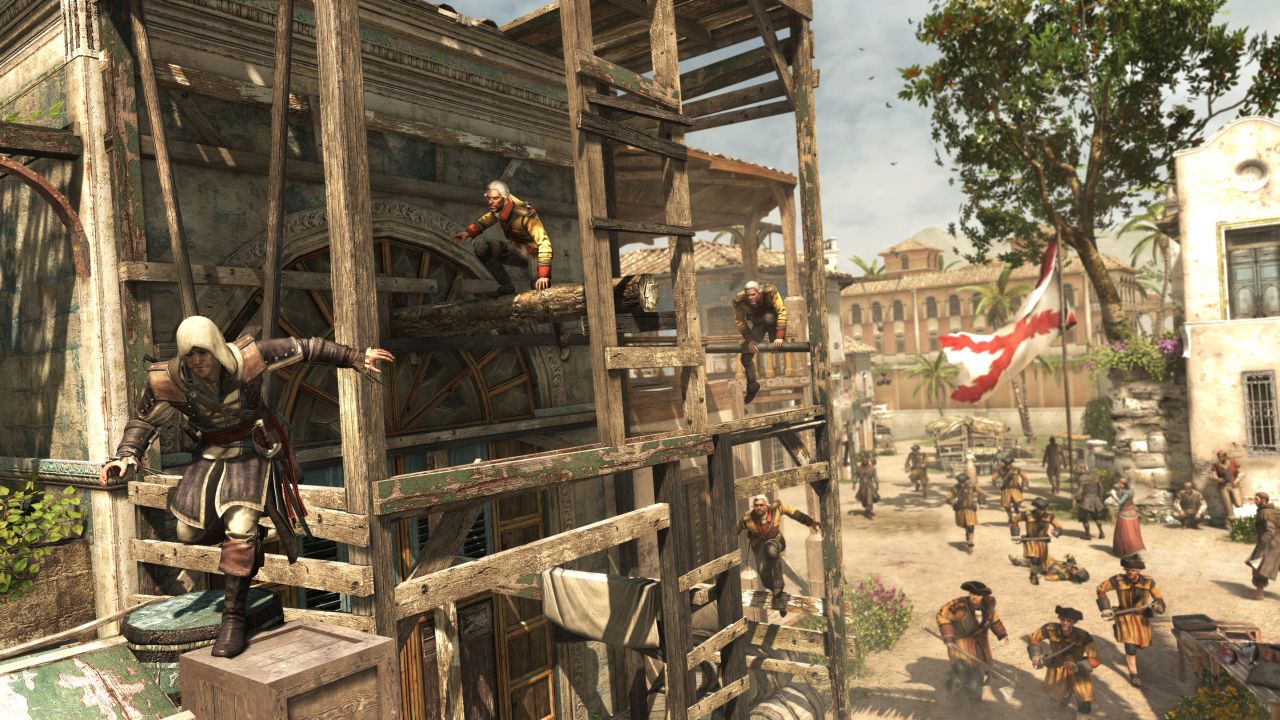
The abovementioned option to take captured ships into Edward’s Fleet plays into another small activity. Like the assassin recruitment in previous titles, your fleet can be tasked with delivering goods across the globe. All ships you have in your possession can be send on trade assignments, earning you extra coin as they go and slowly expanding the amount of trade routes available. It’s a decent distraction, but for some reason one that requires the players to be online and signed into Uplay.
With a switch to the Caribbean setting, it’s not only the gameplay that benefits. A major and culturally popular setting of piracy is presented very well in Black Flag. From character costume design to the era-accurate dialog, the game is a joy to experience. Voice acting is great, and so is the thematic soundtrack. Some of the natural vistas and scenery that you discover across the islands are also very lifelike. From hidden caves to tall waterfalls, underwater wrecks and chaos of a storm, the title looks good with a respectable amount of draw distance. There are some technical issues, mostly with framerate hiccups and missing audio, which dampens some of the excitement. But these problems aren’t frequent enough to seriously detriment the experience.
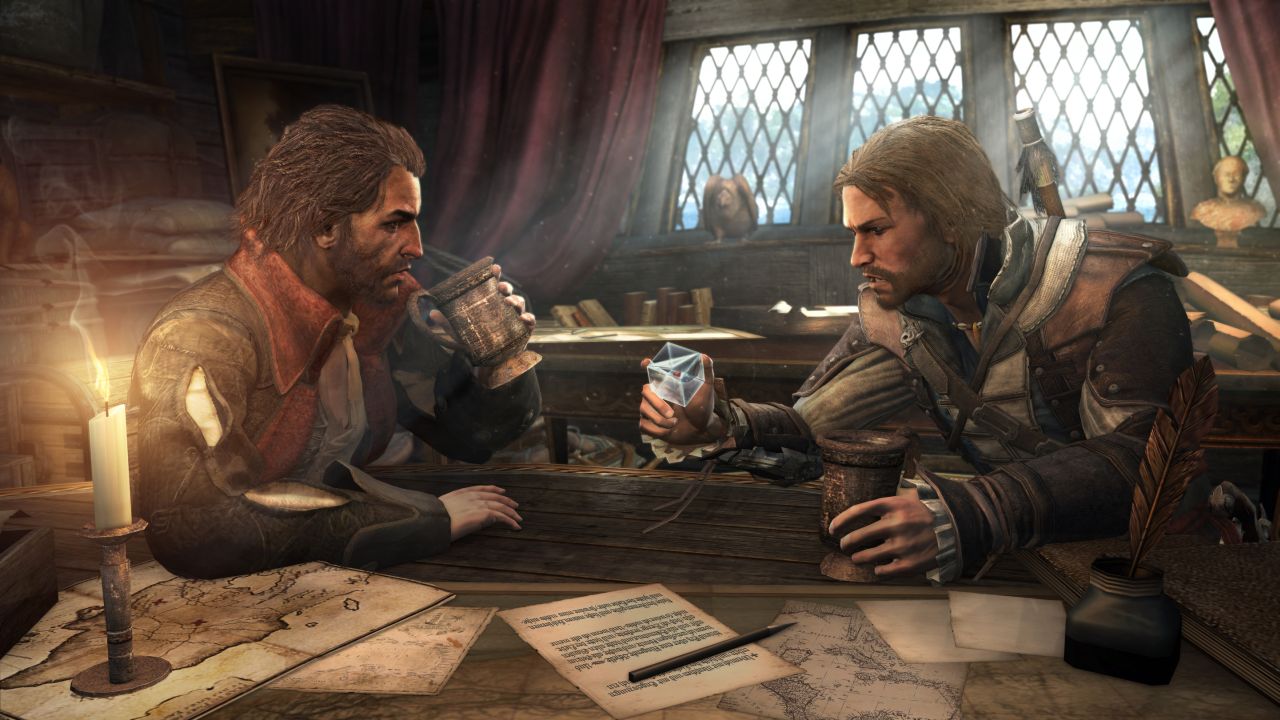
In Multiplayer, the developers have played it fairly safe. The most pressing question you might have is if this grand naval combat is available with friends, and sadly it is not. Instead, we get more of the familiar cooperative and competitive modes from previous games. There’s still the deep character customization, both visual and through perks and abilities system, alongside the staple XP-based level progression. There aren’t any new modes, and all competitive modes - Wanted, Deathmatch, Assasinate, Artifact Assault, Manhunt, and Domination - make their return, with little change, not that any is needed. The cooperative Wolfpack mode has been expanded however; you must play through 25 sequences on any of the 8 maps, with each sequence presenting a unique challenge to complete. This is still a great mode with a moderately competent team on your side.
The Discovery mode of Wolfpack lets you play through all sequences with friends only to learn the ropes, before jumping into the public games, called Unleashed. During matches, the special objectives range from chest defense, to synchronized kills, to a new infected mode. All of these tasks must be competed intermittently with the classic objectives of simply hunting down AI targets for maximum kill points based on stealth and style. It’s a slightly tweaked and expanded experience that flows better than before, but a bit disappointing that there are no wholly new modes.
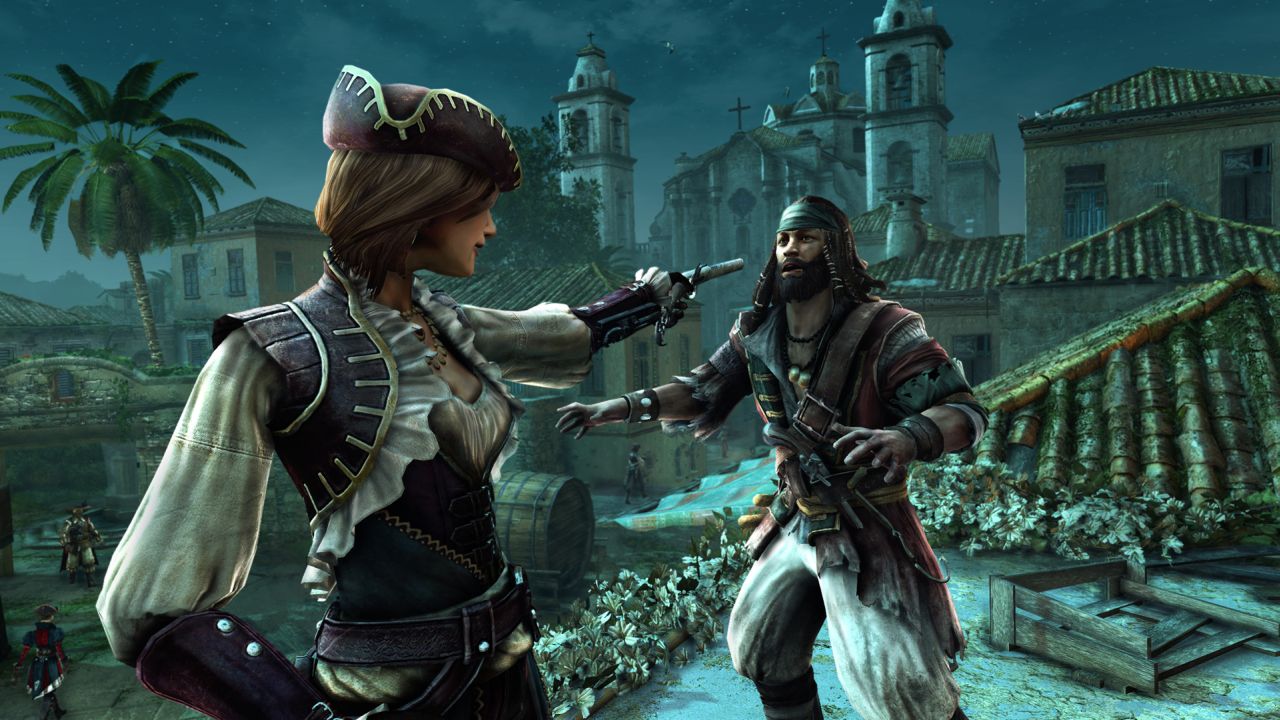
One completely new aspect is the Game Lab. Put simply, it’s a custom multiplayer playlist where users are given the chance to tweak nearly every setting of every game mode. Adjusting time limit, ability buffs, score multipliers, disallowing of perks, etc are all up for tweaking. You can save it for private competitive play, or share with the world for others to try your modifications. Game Lab is essentially allows for custom matches, something that is often seen in shooters. It’s a nice addition, but it doesn’t allow players to complete challenges, increase their ladder rank, or earn full XP. But, for some friends looking to mess around, it’s a good option.
Assassin’s Creed IV: Black Flag brings innovation to a series that has plateaued over the last few years. The core mechanics are still the same, sure, such as stealth, eavesdropping, assassinations et al. But with the huge focus on naval exploration and combat, there is finally something completely new to look forward to. Fans of the pirate culture will be particularly thrilled with this well crafted, and well presented period piece. Although some technical issues are present, they don’t shake the solid overall experience. Multiplayer modes have been tweaked, but lack of any true new options is a bit disappointing. With that, Assassin’s Creed IV: Black Flag is a great entry that sees the series rise up from the depths back to near excellence.
 Comments
Comments




















